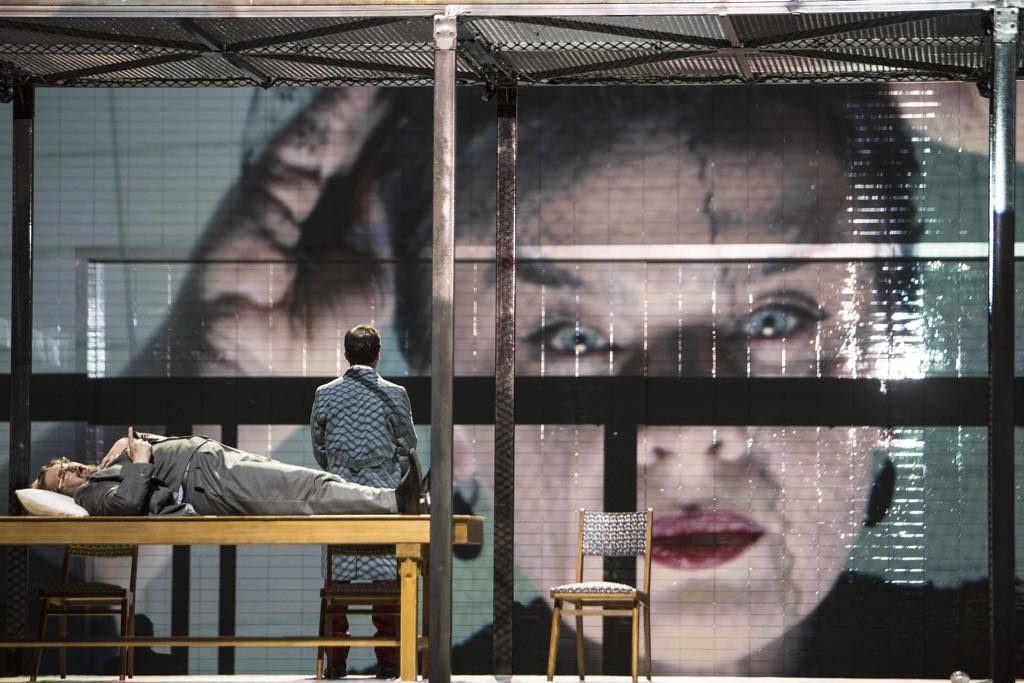
With the necessary fusion of so many musical and theatrical forces, staging opera can be a hazardous business, as was demonstrated at the second performance of Polish director Krzysztof Warlikowski’s new production of Dmitri Shostakovich’s 1934 opera Lady Macbeth of the Mtsensk District at the Bastille Opera House. It was announced after intermission (two-thirds of the way through the opera) that Lithuanian soprano Aušrinė Stundytė, who was playing the title role, had suffered an injury and had been taken to the hospital. With no understudy on standby, the performance had to be terminated. [Editor’s note: as of April 11, she was back on form and onstage after treatment for an injured hand.]
Given the extremely athletic simulated lovemaking in this production, it is unsurprising that injuries occurred. Joking aside, it is hoped that Stundytė will be fit to continue her memorably intense vocal and dramatic performance. She plays Katerina, the bored wife of the son of flour merchant Boris Ismailov, who in this production becomes an abattoir owner, an idea that Warlikowski seems to have taken from the 1987 production of the same piece at the English National Opera in London: hanging carcasses provide a suitably gory metaphor for the bloody events that will occur in the opera.
Placed in the middle of the abattoir is Katerina’s revolving bedroom, which sometimes resembles a cage, representing Katerina’s entrapment, and at other times a boat floating in a shimmering ocean during the more ecstatic moments of her affair with Sergei, a workman employed by the Ismailovs. He is portrayed here with appropriate sleazy charm by a fine-voiced and on many occasions bare-buttocked Pavel Černoch. From the beginning of the opera, a superimposed video of Katarina plunging through icy water periodically returns, pointing forward to her eventual demise.
Even though Warlikowski rarely puts a foot wrong in this searing production of Lady Macbeth of the Mtsensk District, his decision to turn Aksinya (Sofija Petrovič), the worker who is sexually assaulted by male factory workers at the beginning of the opera, into a mistress of Katerina’s father-in-law Boris (Dmitry Ulyanov) not only trivializes the brutality of her experience (very soon after the assault, Aksinya is shown cavorting happily with Boris) but also makes no sense when she is transformed from a singing role to a mute (and, in Sofija Petrovič’s case, grossly overacted) part.
The orchestra and chorus of the Opéra National de Paris are in scintillating form throughout, brilliantly marshaled by German conductor Ingo Metzmacher. At certain moments of extreme drama, members of the brass section play from the upper wings of the theater, sonically immersing the audience in the full horror of the murderous events unfolding onstage.
Lady Macbeth of the Mtsensk District, condemned by the Russian Communist Party, led to much of the harassment and political muzzling Shostakovich was forced to endure for most of the rest of his life. In a production as visceral as this one, it is easy to see why the work was banned from performance in the Soviet Union for nearly 30 years. For those of us who are fortunate (even amid today’s present political turmoil) to live in rather more enlightened times, this production is not to be missed, with (we hope) the extraordinary Aušrinė Stundytė back on exceptional form.
Favorite